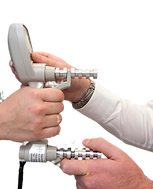About SIMBA
SIMBA is an important medical research study investigating bone and muscle ageing among Aboriginal and Torres Strait Islander people in Victoria.
Our research
50% 26%
Aboriginal and Torres Strait Islander Australians have a substantially greater fracture risk than non-Indigenous Australians. The primary importance and value of this research study is that it will be the first to focus on bone and muscle ageing (or “musculoskeletal ageing”) in Aboriginal and Torres Strait Islander Australians.
For minimal trauma fractures (fractures that result from a fall from standing height):
-
Aboriginal and Torres Strait Islander men are 50% and
-
Aboriginal and Torres Strait Islander women 26%
more likely to experience minimal trauma fractures than non-Indigenous men and women respectively.
The study will:
-
advance our understanding of why fracture and fall risk are higher in Aboriginal and Torres Strait Islander adults
-
improve accuracy in fracture risk assessment
-
increase health literacy in the community
-
improve screening and diagnosis of osteoporosis
-
formulate targeted culturally appropriate intervention strategies to reduce fall and fracture risk in Aboriginal and Torres Strait Islander adults.
Together, the outcomes of this research aim to make a meaningful contribution to ensuring Indigenous Australians receive comparable quality of care to non-Indigenous Australians within our national healthcare system.

Benefits of participating
-
Receive copies of your DXA total hip and lumbar spine scans via your GP
-
Satisfaction of knowing you are contributing to the quality of future research into musculoskeletal health in the community
-
Learn about how medical research projects are conducted

What's the commitment?
If you are eligible and decide to participate, and you will attend 3 Imaging Sessions at Monash Medical Centre, for 2 hours each.
These Imaging Sessions:
-
are spread out over 2 years, with the first occurring within one month of joining, the second at 1 year and the third at 2 years after joining
-
involve physical measurements, questionnaires, bone and body composition imaging and blood tests

Who will see my medical information?
Participants' confidential medical information will be de-identified, which means it will be in no way traceable back to you. De-identified data is stored securely and accessed only by authorised researchers.
You may also request a copy of the report to be sent to your GP.
